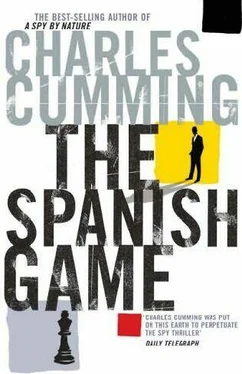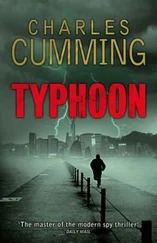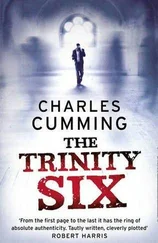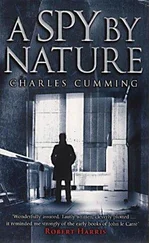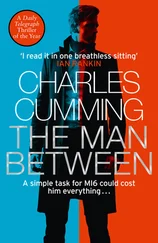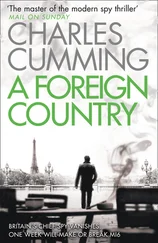Charles Cumming - The Spanish Game
Здесь есть возможность читать онлайн «Charles Cumming - The Spanish Game» — ознакомительный отрывок электронной книги совершенно бесплатно, а после прочтения отрывка купить полную версию. В некоторых случаях можно слушать аудио, скачать через торрент в формате fb2 и присутствует краткое содержание. Жанр: Шпионский детектив, на английском языке. Описание произведения, (предисловие) а так же отзывы посетителей доступны на портале библиотеки ЛибКат.
- Название:The Spanish Game
- Автор:
- Жанр:
- Год:неизвестен
- ISBN:нет данных
- Рейтинг книги:5 / 5. Голосов: 1
-
Избранное:Добавить в избранное
- Отзывы:
-
Ваша оценка:
- 100
- 1
- 2
- 3
- 4
- 5
The Spanish Game: краткое содержание, описание и аннотация
Предлагаем к чтению аннотацию, описание, краткое содержание или предисловие (зависит от того, что написал сам автор книги «The Spanish Game»). Если вы не нашли необходимую информацию о книге — напишите в комментариях, мы постараемся отыскать её.
The Spanish Game — читать онлайн ознакомительный отрывок
Ниже представлен текст книги, разбитый по страницам. Система сохранения места последней прочитанной страницы, позволяет с удобством читать онлайн бесплатно книгу «The Spanish Game», без необходимости каждый раз заново искать на чём Вы остановились. Поставьте закладку, и сможете в любой момент перейти на страницу, на которой закончили чтение.
Интервал:
Закладка:
The Spanish Game
Charles Cumming
‘Madrid is a strange place anyway. I do not believe anyone likes it much when he first goes there. It has none of the look that you expect of Spain… Yet when you get to know it, it is the most Spanish of all cities, the best to live in, the finest people, and month in and month out the finest climate. While other big cities are all very representative of the province they are in, they are either Andalucian, Catalan, Basque, Aragonese, or otherwise provincial. It is in Madrid only that you get the essence… It makes you feel very badly, all question of immortality aside, to know that you will have to die and never see it again.’
Ernest Hemingway1. Exile
The door leading into the hotel is already open and I walk through it into a low, wide lobby. Two South American teenagers are playing Gameboys on a sofa near reception, kicking back in hundred-dollar trainers while Daddy picks up the bill. The older of them swears loudly in Spanish and then catches his brother square on the knot of his shoulder with a dead arm that makes him wince in pain. A passing waiter looks down, shrugs and empties an ashtray at their table. There’s a general atmosphere of listless indifference, of time passing by to no end, the pre-rush lull of late afternoons.
‘Buenas tardes, senor.’
The receptionist is wide shouldered and artificially blonde and I play the part of a tourist, making no effort to speak to her in Spanish.
‘Good afternoon. I have a reservation here today.’
‘The name, sir?’
‘Alec Milius.’
‘Yes, sir.’
She ducks down and taps something into a computer. Then there’s a smile, a little nod of recognition and she writes down my details on a small piece of card.
‘The reservation was made over the internet?’
‘That’s right.’
‘Could I see your passport please, sir?’
Five years ago, almost to the day, I spent my first night in Madrid at this same hotel; a 28-year-old industrial spy on the run from the UK with $189,000 lodged in five separate bank accounts, using three passports and a forged British driving licence for ID. On that occasion I handed a Lithuanian passport issued to me in Paris in August 1997 to the clerk behind the desk. The hotel may have a record of this on their system, so I’m using it again.
‘You are from Vilnius?’ the receptionist asks.
‘My grandfather was born there.’
‘Well, breakfast is between seven thirty and eleven o’clock and you have it included as part of your rate.’ It is as if she has no recollection of having asked the question. ‘Is it just yourself staying with us?’
‘Just myself.’
My luggage consists of a suitcase filled with old newspapers and a leather briefcase containing some toiletries, a laptop computer and two of my three mobile phones. We’re not planning to stay in the room for more than a few hours. A porter is summoned from across the lobby and he escorts me to the lifts at the back of the hotel. He’s short and tanned and genial in the manner of low-salaried employees badly in need of a tip. His English is rudimentary, and it’s tempting to break into Spanish just to make the conversation more lively.
‘This is being your first time in Madrid, yes?’
‘Second, actually. I visited two years ago.’
‘For the bullfights?’
‘On business.’
‘You don’t like the corrida?’
‘It’s not that. I just didn’t have the time.’
The room is situated halfway down a long, Barton Fink corridor on the third floor. The porter uses a credit-card sized pass key to open the door and places my suitcase on the ground. The lights are operated by inserting the key in a narrow horizontal slot outside the bathroom door, although I know from experience that a credit card works just as well; anything narrow enough to trigger the switch will do the trick. The room is a reasonable size, perfect for our needs, but as soon as I am inside I frown and make a show of looking disappointed and the porter duly asks if everything is all right.
‘It’s just that I asked for a room with a view over the square. Could you see at the desk if it would be possible to change?’
Back in 1998, as an overt target conscious of being watched by both American and British intelligence, I ran basic counter-surveillance measures as soon as I arrived at the hotel, searching for microphones and hidden cameras. Five years later, I am either wiser or lazier; the simple, last-minute switch of room negates any need to sweep. The porter has no choice but to return to reception and within ten minutes I have been assigned a new room on the fourth floor with a clear view over Plaza de Santa Ana. After a quick shower I put on a dressing gown, turn down the air conditioning and try to make the room look less functional by folding up the bedspread, placing it in a cupboard and opening the net curtains so that the decent February light can flood in. It’s cold outside, but I stand briefly on the balcony looking out over the square. A neat line of chestnut trees runs east towards the Teatro de Espana where a young African man is selling counterfeit CDs from a white sheet spread out on the pavement. In the distance I can see the edge of the Parque Retiro and the roofs of the taller buildings on Calle de Alcala. It’s a typical midwinter afternoon in Madrid: high blue skies, a brisk wind whipping across the square, sunlight on my face. Turning back into the room I pick up one of the mobiles and dial her number from memory.
‘Sofia?’
‘Hola, Alec’
‘I’m in.’
‘What is the number of the room?’
‘Cuatrocientos ocho. Just walk straight through the lobby. There’s nobody there and they won’t stop you or ask any questions. Keep to the left. The elevators are at the back. Fourth floor.’
‘Is everything OK?’
‘Everything’s OK.’
‘Vale,’ she says. Fine. ‘I’ll be there in an hour.’
2. Baggage
Sofia is the wife of another man. We have been seeing each other now for over a year. She is thirty years old, has no children and has been married, unhappily, since 1999. To meet in the Reina Victoria hotel is something that she has always wanted us to do, and with her husband due back in Madrid on an 8 a.m. flight tomorrow, we can stay here until the early hours of the morning.
Sofia knows nothing about Alec Milius, or at least nothing of any hard fact or consequence. She does not know that at the age of twenty-four I was talent-spotted by MI6 in London and placed inside a British oil company with the purpose of befriending two employees of a rival American firm and selling them doctored research data on an oilfield in the Caspian Sea. Katharine and Fortner Simms, both of whom worked for the CIA, became my close friends over a two-year period, a relationship which ended when they discovered that I was working for British intelligence. Sofia is not aware that in the aftermath of the operation my former girlfriend, Kate Allardyce, was murdered in a car accident engineered by the CIA, alongside another man, her new boyfriend, Will Griffin. Nor does she know that in the summer of 1997 I was dismissed by MI5 and MI6 and threatened with prosecution if I revealed anything about my work for the government.
As far as Sofia is concerned, Alec Milius is a typical footloose Englishman who turned up in Madrid in the spring of 1998 after working as a financial correspondent for Reuters in London and, latterly, St Petersburg. He has lost touch with the friends he knew from school and university, and both his parents died when he was a teenager. The money they left him allows him to live in an expensive two-bedroom flat in downtown Madrid and drive an Audi A6 for work. The fact that my mother is still alive and that the last five years of my life have been largely funded by the proceeds of industrial espionage is not something that Sofia and I have ever discussed.
Читать дальшеИнтервал:
Закладка:
Похожие книги на «The Spanish Game»
Представляем Вашему вниманию похожие книги на «The Spanish Game» списком для выбора. Мы отобрали схожую по названию и смыслу литературу в надежде предоставить читателям больше вариантов отыскать новые, интересные, ещё непрочитанные произведения.
Обсуждение, отзывы о книге «The Spanish Game» и просто собственные мнения читателей. Оставьте ваши комментарии, напишите, что Вы думаете о произведении, его смысле или главных героях. Укажите что конкретно понравилось, а что нет, и почему Вы так считаете.
